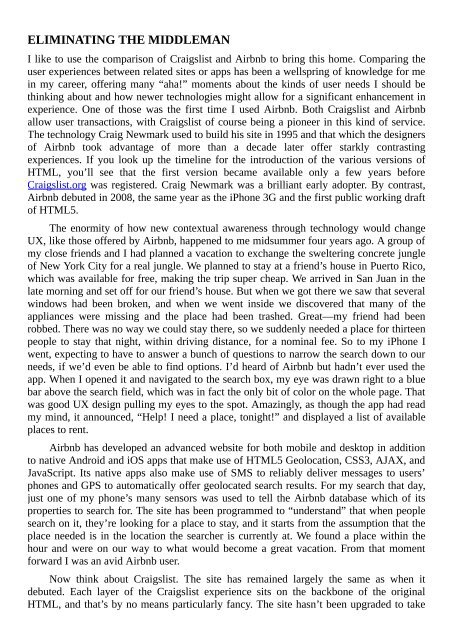Create successful ePaper yourself
Turn your PDF publications into a flip-book with our unique Google optimized e-Paper software.
ELIMINATING THE MIDDLEMAN<br />
I like to use the comparison of Craigslist and Airbnb to bring this home. Comparing the<br />
user experiences between related sites or apps has been a wellspring of knowledge for me<br />
in my career, offering many “aha!” moments about the kinds of user needs I should be<br />
thinking about and how newer technologies might allow for a significant enhancement in<br />
experience. One of those was the first time I used Airbnb. Both Craigslist and Airbnb<br />
allow user transactions, with Craigslist of course being a pioneer in this kind of service.<br />
The technology Craig Newmark used to build his site in 1995 and that which the designers<br />
of Airbnb took advantage of more than a decade later offer starkly contrasting<br />
experiences. If you look up the timeline for the introduction of the various versions of<br />
HTML, you’ll see that the first version became available only a few years before<br />
Craigslist.org was registered. Craig Newmark was a brilliant early adopter. By contrast,<br />
Airbnb debuted in 2008, the same year as the iPhone 3G and the first public working draft<br />
of HTML5.<br />
The enormity of how new contextual awareness through technology would change<br />
UX, like those offered by Airbnb, happened to me midsummer four years ago. A group of<br />
my close friends and I had planned a vacation to exchange the sweltering concrete jungle<br />
of New York City for a real jungle. We planned to stay at a friend’s house in Puerto Rico,<br />
which was available for free, making the trip super cheap. We arrived in San Juan in the<br />
late morning and set off for our friend’s house. But when we got there we saw that several<br />
windows had been broken, and when we went inside we discovered that many of the<br />
appliances were missing and the place had been trashed. Great—my friend had been<br />
robbed. There was no way we could stay there, so we suddenly needed a place for thirteen<br />
people to stay that night, within driving distance, for a nominal fee. So to my iPhone I<br />
went, expecting to have to answer a bunch of questions to narrow the search down to our<br />
needs, if we’d even be able to find options. I’d heard of Airbnb but hadn’t ever used the<br />
app. When I opened it and navigated to the search box, my eye was drawn right to a blue<br />
bar above the search field, which was in fact the only bit of color on the whole page. That<br />
was good UX design pulling my eyes to the spot. Amazingly, as though the app had read<br />
my mind, it announced, “Help! I need a place, tonight!” and displayed a list of available<br />
places to rent.<br />
Airbnb has developed an advanced website for both mobile and desktop in addition<br />
to native Android and iOS apps that make use of HTML5 Geolocation, CSS3, AJAX, and<br />
JavaScript. Its native apps also make use of SMS to reliably deliver messages to users’<br />
phones and GPS to automatically offer geolocated search results. For my search that day,<br />
just one of my phone’s many sensors was used to tell the Airbnb database which of its<br />
properties to search for. The site has been programmed to “understand” that when people<br />
search on it, they’re looking for a place to stay, and it starts from the assumption that the<br />
place needed is in the location the searcher is currently at. We found a place within the<br />
hour and were on our way to what would become a great vacation. From that moment<br />
forward I was an avid Airbnb user.<br />
Now think about Craigslist. The site has remained largely the same as when it<br />
debuted. Each layer of the Craigslist experience sits on the backbone of the original<br />
HTML, and that’s by no means particularly fancy. The site hasn’t been upgraded to take


